"The bravest of the brave." Marshal Ney: from Lutzen to Waterloo
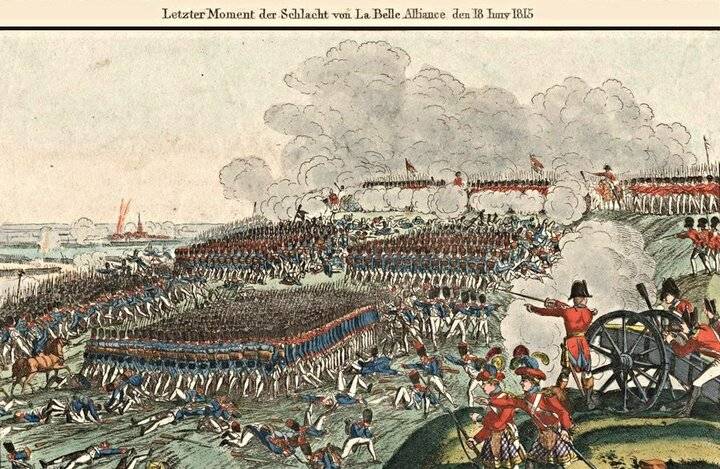
F. Camp. March of the French grenadiers against the British infantry
Article "The bravest of the brave." Marshal Ney: from Valmy to Berezina We ended with the message that on December 14, 1812, Marshal Michel Ney was one of the last in Napoleon's Great Army to leave the Russian Empire. On April 1, 1813, Napoleon issued a decree granting her the title of Prince of Moskvoretsky. And then hostilities resumed.
1813 Campaign
In 1813, the army of the French Empire rose like a phoenix from the ashes. It no longer had so many cavalry and artillery pieces, but at first Napoleon won again - but without the usual brilliance. Victories were given with difficulty, and the enemy armies, having escaped defeat, retreated in order to, having received reinforcements, enter into new battles. Napoleon was still winning, but his marshals were already defeated.
The campaign of 1813 Ney began with the Battle of Lützen, where he commanded three corps. The allied forces of Russia and Prussia under the command of Wittgenstein, in the presence of Alexander I and Friedrich Wilhelm, attacked the French vanguard, commanded by Ney. After the approach of the main forces led by Napoleon, they had to retreat. Due to the lack of a sufficient number of cavalry units, the French failed to organize their full-fledged pursuit.
In this battle, Ney was wounded in the leg. At the same time, Marshal Bessière, who was standing next to him, died.
Then there was a two-day battle at Bautzen (in front of Napoleon's eyes, then the Chief Marshal Duroc was mortally wounded). A convincing victory for Napoleon did not happen here either.
The French also succeeded in defeating the grandiose battle at Dresden. A cannonball then killed General Moreau, who entered the Russian service, who, at Alexander's insistence, was to become the commander-in-chief of the allied armies.
These three battles - at Lützen, Bautzen and Dresden, ended in favor of the French, but the victories were unconvincing and came at too high a price. In addition, simultaneously with the victory at Dresden, the French were defeated at the Katzbach River, where MacDonald's corps was defeated by the Russian-Prussian army under the command of Blucher. And then the battle of Kulm ended in defeat for the French, in which General Vandam was taken prisoner.
On September 6, 1813, at Dennewitz, Ney was defeated in a battle with the Prussians of Büllow and the Swedes of Bernadotte. And then there was a terrible defeat at Leipzig, in which the shell-shocked Ney still managed to withdraw his troops in relative order. Now the French were forced to leave Germany.
1814 year
In 1814, Ney received command of the Young Guard unit. There were already many young soldiers who were mockingly called "Marie-Louise" (after Bonaparte's wife, who signed the decrees on new recruiting). Ney fought at Brienne, La Rottier, in the so-called Six Day War, at Craon, Laon and Arsy-sur-Aube. It was a fantastic campaign: Napoleon was winning everywhere and everywhere. He himself later said that “put on the boots of 1796". However, many historians believe that then Napoleon surpassed himself. And a series of battles from January 29 to February 2, 1814, in which he won victories at Champobert, Montmirail, Chateau-Thierry and Voshan, putting Blucher's army (in which the Russian and Prussian corps were located) on the brink of a military catastrophe, is considered by many to be the top of military leadership. Bonaparte.
But the fate of France was decided in Paris, which was surrendered to the allies Marmont and Mortier. This was discussed in detail in the article. The first renunciation of Napoleon, we will not repeat ourselves. It was Ney who led a group of marshals who, after the surrender of Paris, demanded the abdication of the emperor. He, along with Caulaincourt and MacDonald, handed over to Alexander I the act of Napoleon's abdication from the throne.
Ney became one of those marshals who took the oath of office to Louis XVIII. Submission to the Bourbons, in addition to him, was shown by such famous military leaders as MacDonald, Augereau, Serurier, Brunn, Berthier, Monsey, Victor, Oudinot and Marmont. For this, Ney was awarded the Order of Saint Louis, received the post of commander of the military district in Besançon, the corps of royal cuirassiers, dragoons, rangers and chevolgers, became the peer of France. She also retained the titles of Duke of Elchingen and Prince of Moskvoretsky. However, both the Bourbons and the aristocrats who arrived with them really did not understand anything, and did not learn anything. And very soon Ney, who had preserved his property and titles, realized that he remained in the eyes of the arrogant emigrants a boorish man. He left Paris for his estate Kudro. To the former adjutant Octave Levasseur, who visited him there, he said:
What can we say about ordinary Frenchmen?
And these aristocrats for some reason seriously counted on the loyalty of Ney and other veterans of the Napoleonic campaigns, who were permanently insulted by them. And then they were very surprised: why no one wants to protect them from the "Corsican monster"?
"Flight of the eagle"
So, on March 1, 1815, Napoleon with a handful of soldiers landed in the Bay of Juan and began his triumphal journey to Paris. Michel Ney, directed against Bonaparte, went over to his side.
Did she deceive Louis XVIII when, during his last audience, he promised him to bring Napoleon in an iron cage? Or was he really going to carry out the king's order and capture the emperor heading for Paris?
It should be said that Ney quickly realized that he had minimal opportunities to arrest Napoleon. There was no guarantee that the soldiers would obey in the event of an order to attack the emperor. In addition, at the time of Ney's meeting with Bonaparte, he (unexpectedly) had half the number of soldiers than Napoleon. In general, at that time, Ney himself had much more chances of being in an iron cage. To the same Levasseur Ney will say later:
And he would advise the royalist colonel Dubalen to leave the army as soon as possible, because he could not ensure his safety.
This was the result of the activities of the emigrants who returned to France just a year ago.
At the same time, Ney did not rush into Napoleon's arms. On the contrary, upon meeting, he handed him a very tough letter, which outlined the conditions for going over to his side:
The former warm and close relationship between the emperor and the marshal was out of the question. It got to the point that Ney again left for his estate, and, seeing him in Paris at the May Field festival, Napoleon, either seriously, or with a mockery, said:
And only at the last moment, already going to the army, Napoleon writes to Davout:
Like, not very much and it is necessary, but if he really wants - so be it, let him come, stand on the sidelines.
And which of the old comrades-in-arms was next to Napoleon at that moment? Davout, who did not lose a single battle (and did not swear allegiance to the Bourbons after Napoleon's abdication), was left in Paris. Massena and Mortier "got sick". Refused to come from Bavaria, Bonaparte's stepson Eugene (Eugene) Beauharnais. Augereau himself expressed his readiness to appear, but received an order to leave for one of his estates, and then was excluded from the list of marshals (the reasons for this attitude of Napoleon to him will be discussed in a separate article). Expelled by the Austrians from his kingdom, Murat offered Napoleon the services of a cavalry commander (the best of all possible) - and received no answer. On Saint Helena, Bonaparte regretted it. Already quite elderly at that time, Lefebvre (60 years old, after all) limited himself to congratulations, but avoided the service. Berthier left after the Bourbons. No Macdonald and Marmont remained loyal to Louis XVIII. Soult is under Napoleon: the emperor appoints him chief of staff. There is still recently received the rank of Marshal Pears - a fairly experienced, executive and experienced general, but who did not grab stars from the sky, who never commanded an army. Under these conditions, Napoleon still doubts whether to call him Ney? And Davout omits this insulting "if he wants to" in his letter.
Napoleon's last campaign
The French army went north to Belgium, and a chain of mistakes and accidents began - seemingly small and insignificant, but with great consequences.
The impeccable Marshal Davout, who never let Napoleon down, remains in Paris. And no one can replace him during the campaign in Belgium.
In the Battle of Linyi (June 16, 1815), Napoleon defeated the Prussians: the enemy's losses in killed and wounded reached 20 thousand, Blucher, who fell from his horse, was almost trampled by the horses of French cuirassiers. And Gneisenau, who had lost sight of him, changed the direction of the army's withdrawal: instead of Namur, it went to Wavre. The Prussians found themselves much closer to Wellington's English army than had been anticipated.
Ney on the same day defeats the British and their allies at Kart-Bra. Subordinate to him, General Drouet d'Erlon was supposed to go to the rear of Wellington's army, but Napoleon turns him around and orders him to go to Ligny. As a result, d'Erlon's detachment does not fulfill the task assigned to him by Nei, but does not have time to go into the rear of the already withdrawn Prussian army. Therefore, despite heavy losses, both enemy armies are retreating in perfect order.
Napoleon divides the army: with Nei he goes against Wellington, and Gruschi instructs to pursue the Prussian troops of Blucher. And this mistake can no longer be corrected.
The Battle of Waterloo
On June 18, the day of the Battle of Waterloo, the count goes on for hours, but the French attack is postponed due to the rain that had passed the day before: it is impossible to move heavy artillery pieces on wet ground. Only at about 11:30 volleys of French cannons heralded the beginning of one of the most significant battles in the world. stories.
Napoleon's plan was to break through the center of the English positions, but in order to force Wellington to weaken his positions there, Napoleon orders an attack on the well-fortified Ugumon farm on the right flank of the British - and again loses both strength and time.
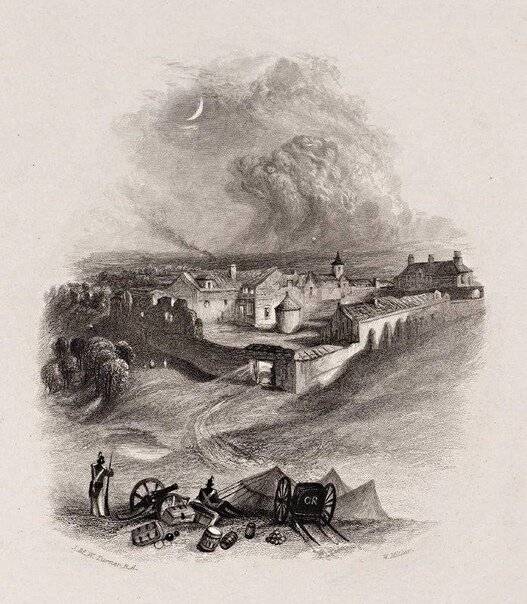
The castle-like Ugumon farm. Some sources claim that it belonged to the family of Victor Hugo.
Up to 14 thousand Frenchmen fiercely stormed Ugumon throughout the day, which was defended by a combined detachment of 12 thousand people - and they could not take it. In the battle for this farm, Jerome Bonaparte was wounded.
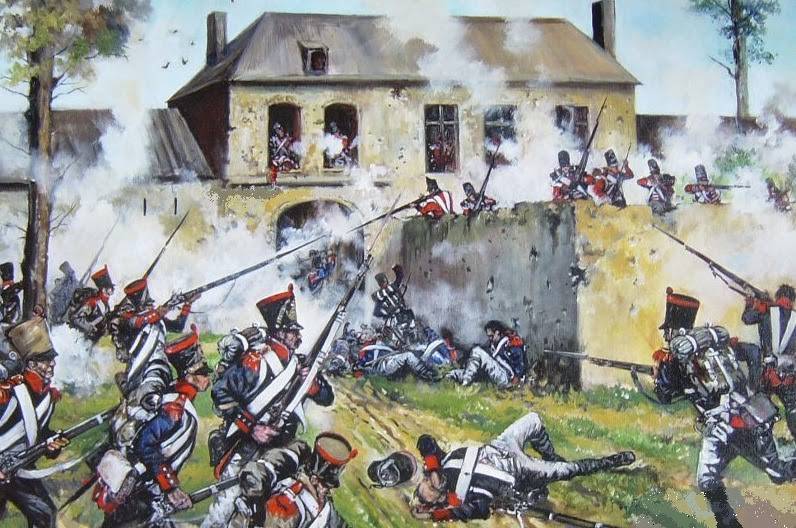
Fight for Ugumon Farm
Pears hears cannonade from just 18 km from the battlefield - much closer than Blucher. Generals Gerard and Vandam beg him to hurry to the aid of the emperor, but Grushi meticulously fulfills the earlier received order - he goes to Wavre, where only the rearguard units of the Prussian army are located.
Napoleon orders Soult to find Pears - and he, instead of 10 or 15 messengers who would go in search of different roads, sends one adjutant.
She is in charge of the attacks on the center and right flank of Wellington's army. The attack on British positions in the first stage of the battle was led by General d'Erlon. The French infantry, in order to reduce losses from the enemy's rifle fire, did not advance in columns, but in lines - and could not quickly rebuild in square under the attack of the British cavalry. French cavalry came to the aid of their infantrymen, a fierce felling ensued, it was not possible to break through the positions of the British and their allies. At that time, some troops appeared on the horizon - and they were the Prussians.
The most experienced Ney suddenly threw three cavalry divisions against the British infantry squares. But he did not "go crazy", as Napoleon later said. Wellington, in order to reduce losses from the fire of the French artillery, ordered to withdraw the troops 100 steps back. This movement was mistaken for a retreat. And therefore it was decided to complete the defeat with a blow from the cavalry units. Moreover, for the third attack in a row, Napoleon himself assigned her two reserve cavalry divisions.
Shaw-Kennedy, an Englishman who watched the first attack, recalled:
The attack follows the attack, some of the English squares are defeated, but since the French cavalry is not supported by the infantry, they immediately close.
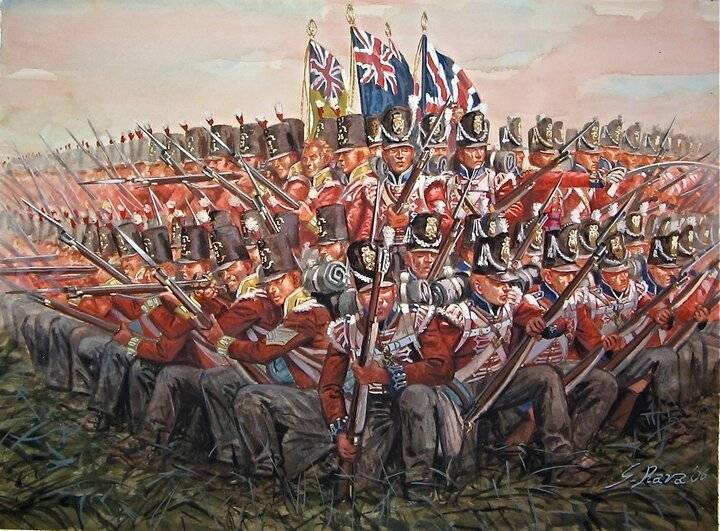
Giuseppe Rava. A square of English infantry at Waterloo
British artillery strikes are simply devastating. Under Neem, three horses were killed in two hours (and in a day - 5).
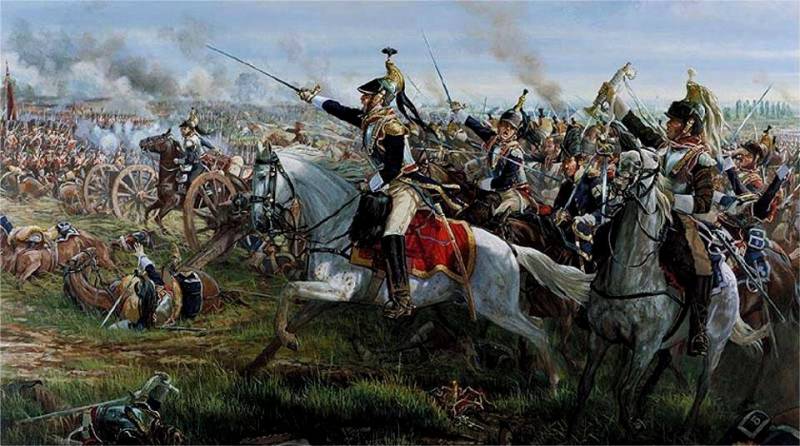
T.M. Charms. Ney leads a cavalry charge against a square of British infantry on the slopes of Mont Saint-Jean
The French cavalry divisions have lost half of their personnel, but Wellington's army also suffers heavy losses, many killed and wounded. Some units even flee from the battlefield, some of these fugitives get to Brussels and report the defeat of Wellington. The first of the corps of the Prussian army (under the command of Bülow) at this time is approaching the village of Planchenois, on which the right flank of the French rests. He cannot immediately join the battle: the soldiers need rest, and in order to line up the units in battle formation, it also takes time. Finally, at about 16:30 pm, he attacks the French positions near the village of Planchenois, but the Young Guard repels this attack. And Ney, at last, after 18:00, captured the La-Haut-Sainte farm located in the center of the British positions, and the French brought up their artillery units here. It seems that the Ugumon farm on the right flank of the British is also about to fall. Napoleon sends messengers to Paris with the news of the victory.
Wellington utters famous phrases: first - “We seem to be losing the battle"And then asks"night or Blucher».
The most interesting thing is that 13 km from it - in the area of Tubiz and Halle, at that time there was a 17-thousandth corps of Prince Frederick of the Netherlands. Wellington put it there himself - and forgot about it.
At Wavr, Grusha is now successfully fighting the Prussian rearguard.
And the French guards can barely hold on to Planchenois.
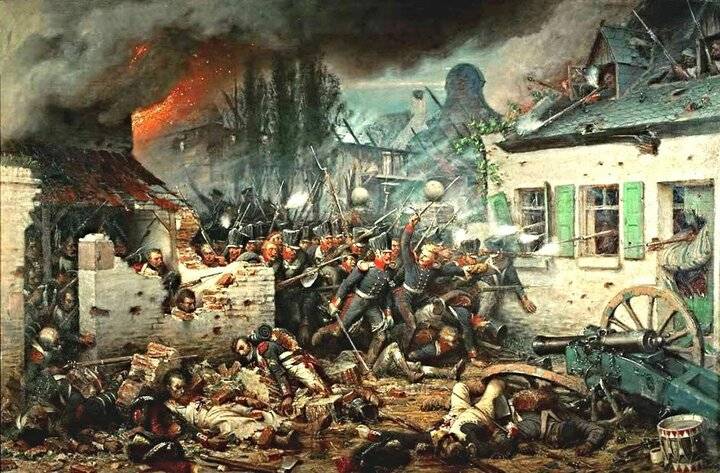
A. Horten. The assault on Planchenois by the Prussian infantry
Napoleon has no time left, and he sends into battle the Old Guard - two grenadier and two Jaeger regiments, which are supported by the Middle Guard. With his guards, Napoleon goes to La-et-Sainte and hands them over to her command. Wellington is gathering his last reserves, whatever parts he still has. These are the British Guards Brigade of Maitland, the infantry brigades of Adams, Colin Hullketh, the Dutch brigade Chassé, the Brunswick units of Dietmers, the cavalrymen of Vivian and Vandeleur, three artillery batteries.
The first column of guards overturns the 30th and 73rd British regiments, but its advance is stopped by the Chasse brigade.
The second column under artillery fire ascends to the Mont-Saint-Jean plateau and captures the batteries.
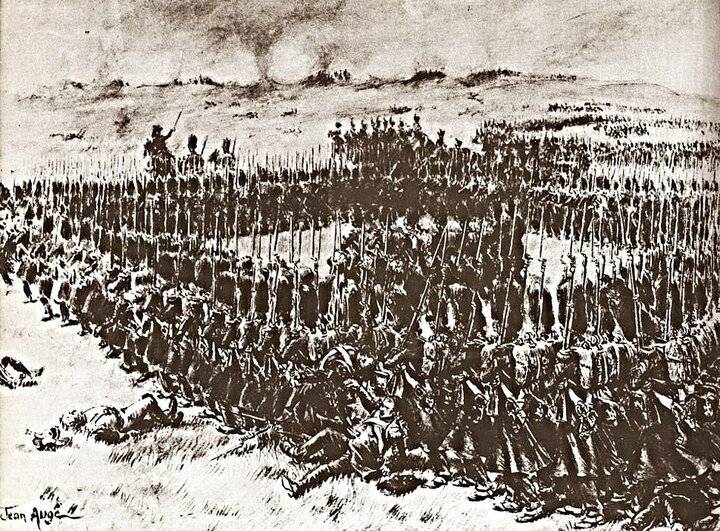
Jean Oj. Attack of the Old Guard on the Mont-Saint-Jean plateau
But in a field of unmown wheat lie the foot soldiers of General Peregrine Maitland. Now they rise: four lines of enemy soldiers seem to rise in front of the astonished French. Their volley kills about 300 people at once, the subsequent bayonet attack puts the rangers to flight.
The third column of French Guards does not withstand the fire and attacks of the Adams Brigade and Colborne's 52nd Regiment.
The sight of the fleeing guards made a heavy impression on the French army. At this time, the Prussians, who approached, struck on the right, and, seeing their attack, Napoleon said:
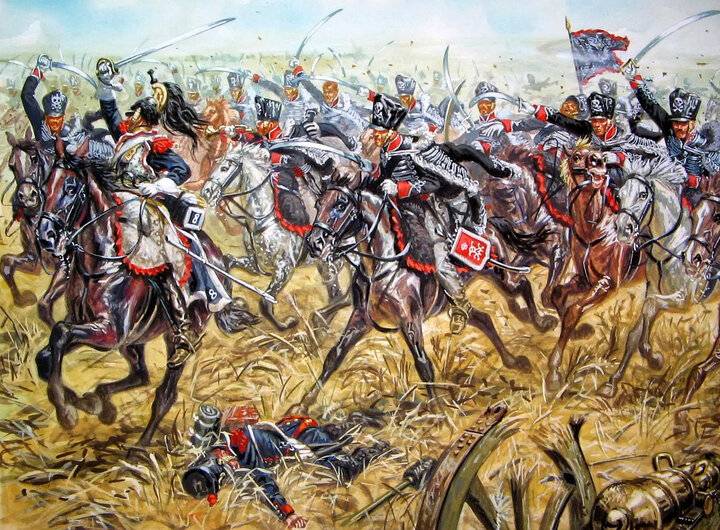
Giuseppe Rava. Prussian "hussars of death"
The Young Guard and two battalions of the Old Guard tried for some time to hold back the Prussian offensive at Planchenois, but were soon forced to retreat. Panic seized the French troops. Ney stands in one square, then in another, but cannot stop the retreat. It is said that then he exclaimed:
And Napoleon at that time was in the square of the Old Guard, assembled by Cambronne. He even tried to get into line with a musket, but the adjutants at the first opportunity put him on a horse and sent him farther to the rear. And then a carriage was found for the emperor, on which he left for Paris. The square in which he recently stood was shot by the British - after the French refused to surrender.
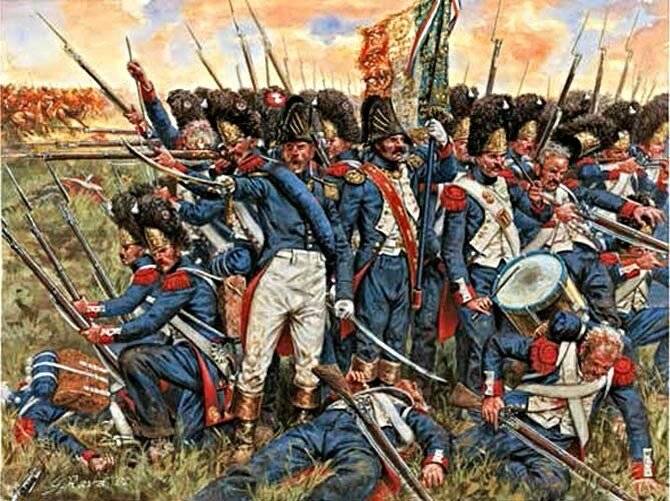
Giuseppe Rava. The last square of the French Imperial Guard at Waterloo
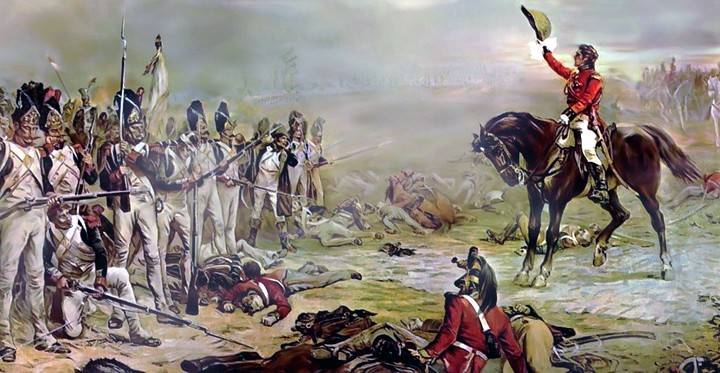
Robert Alexander Hillingford. General Hill addresses the last square of the Old Guard at Waterloo
According to a beautiful legend, its commander, Cambronne, shouted then:
However, Cambronne himself, who miraculously survived, later claimed that he had said only one indecent word - the first thing that came to his mind.
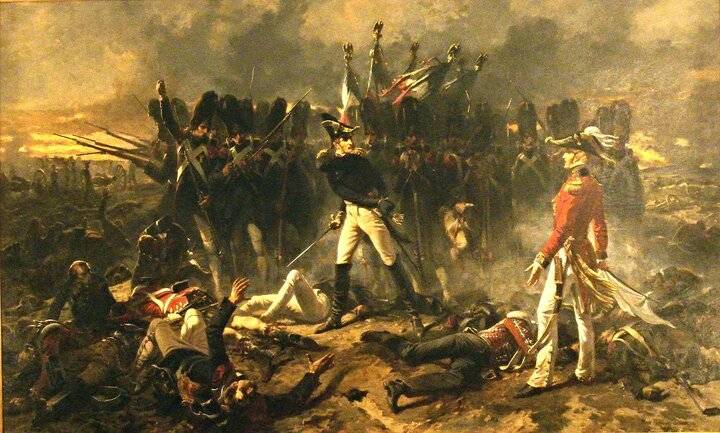
Charles Edouard Armand-Dumaresque. General Cambronne at Waterloo
In Paris, Napoleon told Caulaincourt, who met him, that “the army worked wonders", But then the troops"panic gripped". And he blamed Ney for the defeat, who “behaved like crazy”And destroyed the cavalry (recall that Napoleon actually approved of Ney's actions, allocating two reserve cavalry divisions for the third attack of the enemy squares).
Her, for whom there was no "no core, no bullet", And which, despite all efforts, failed to show,"how the marshal of France dies", Left the battlefield in the general crowd of retreating. He walked for a long time, then got hold of a horse and also went to Paris.
In the next article we will finish the story about Marshal Her.
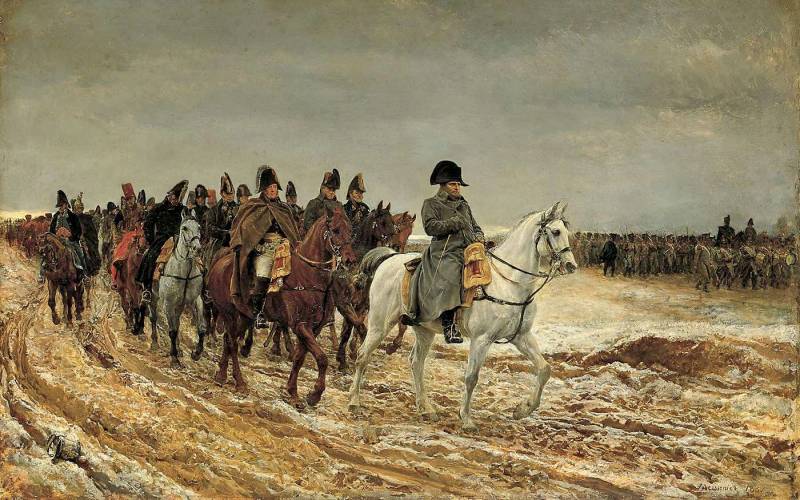
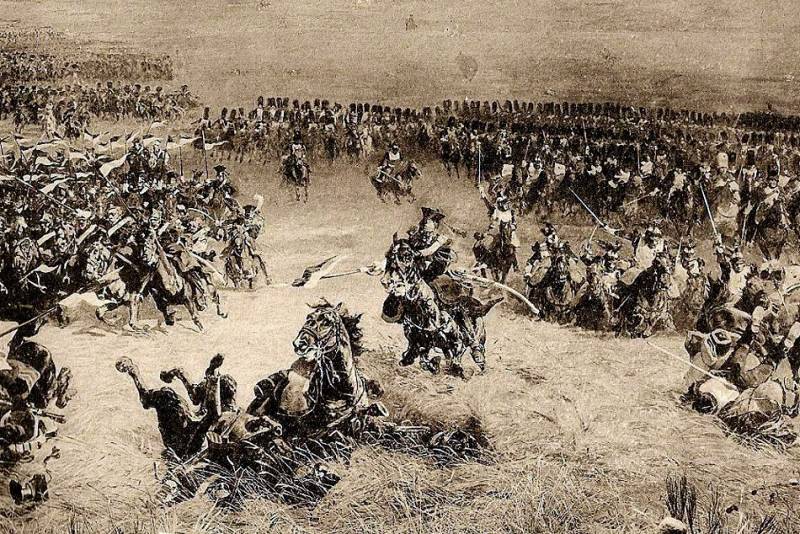
Information